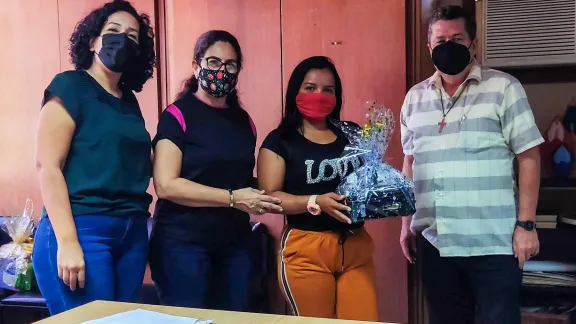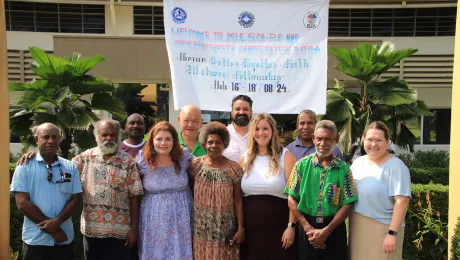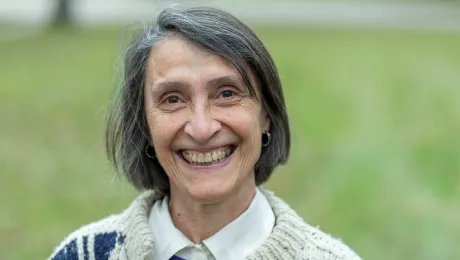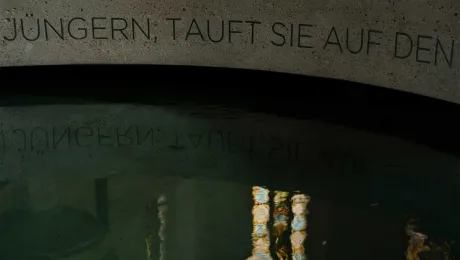
From left to right: IELV project coordinator Judith Bracho Villegas, Elisabeth Perez de Hands, Yuseidy Bolivar and IELV Pastor President Rev. Gerardo Hands, during a visit to deliver livelihood recovery kits. Photo: IELV
LWF-supported project builds resilience during crisis
(LWI) - Hidden from the visible impact of complex humanitarian crises are the tough choices women in low-income communities often have to make between catering to their own critical needs and providing food and other basics for their families. In Venezuela’s northern region, the Lutheran church is supporting women to access safe and affordable menstrual hygiene, while empowering them to establish alternative income sources and discuss early prevention of gender-based violence (GBV).
In La Isabelica and Ricardo Urriera communities in the northern municipality of Miguel Peña, the Evangelical Lutheran Church in Venezuela (IELV) conducts workshops and offers menstrual cups for women in families whose financial resources have been further constrained by the COVID-19 pandemic impact on top of the country’s political and economic crisis. The aim is to “ensure that women can manage their monthly periods in a cost-effective way, go about their activities in comfort, and restore their sense of dignity,” said Judith Bracho Villegas, the project’s coordinator.
When family income is limited, menstrual hygiene is no longer a priority over basic needs such as food and shelter. The provision of menstrual cups, a reusable sanitary item, is of tremendous help to these women.
“When family income is limited, menstrual hygiene is no longer a priority over basic needs such as food and shelter. The provision of menstrual cups, a reusable sanitary item, is of tremendous help to these women. It gives them back their freedom and dignity,” Bracho noted.
COVID-19 Rapid Response Fund
The Lutheran World Federation (LWF) has been supporting the six-month project presented by IELV through its COVID-19 Rapid Response Fund (RRF). The fund enables churches in the communion to address the most immediate needs following the global health pandemic and build longer-term recovery projects in congregations and communities. In Venezuela, the LWF World Service program in the country accompanied the church during some phases of the project implementation.
Bracho explained that many women in low-income communities had resorted to using rags from old cloths to manage their menstruation, as they simply cannot afford sanitary pads or tampons. “This affects their confidence and sense of value, and prevents them from carrying out normal activities outside the home. This was particularly difficult for those formally employed or attending educational activities.”
Today, more than 210 women have benefited from the IELV project. The menstrual cups are introduced at workshops that discuss women’s hygiene, small-scale income generating activities, as well as psychosocial support. From these meetings, topics of interest are suggested, with GBV prevention emerging as an important subject for which the church is offering additional support through WhatsApp groups.

Menstrual cups delivery day in La Isabelica. Photo: IELV
Seed capital
The women receive small financial grants, with which they set up businesses that they manage from home. From a seed capital of USD 80 dollars, Yuseidy Bolivar, now runs a part-time hair and nail beauty salon, with about 15 customers per month. Her membership in the project’s WhatsApp groups gives her a platform to advertise her services to more than 120 contacts, who can help grow her business. “I started with the vision that I will buy more materials to increase my work,” she said.
The LWF-supported project is a good example of seed capital for a church that already has considerable experience in training for self-employment as a mechanism for recovering livelihoods, said Bracho. “We confirmed that in most cases women are not only burdened by the lack of a skill that can be transformed into a business, but that without minimum resources, it is simply impossible to undertake a productive activity. Here, the women who received seed capital have been able to start their businesses and have begun to earn a regular income to support their families.”
The IELV project coordinator said she hoped some of the lessons learned from the LWF-supported project will help the church to improve its strategic approaches and define principles and good practices for future projects.
“Bodies are sacred. Menstruation is part of the lives of teenagers and women. It should and cannot be seen as shameful or a source for stigmatization, but as part of a healthy life. Providing the basic resources empowers women to carry out their daily activities with confidence,” added Rev. Dr Marcia Blasi, LWF Program Executive for Gender Justice and Women’s Empowerment.
By LWF/P. Mumia


